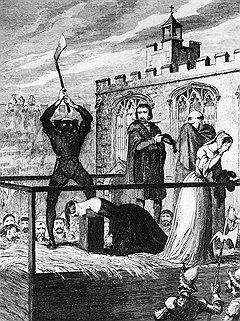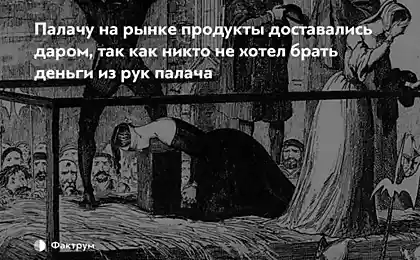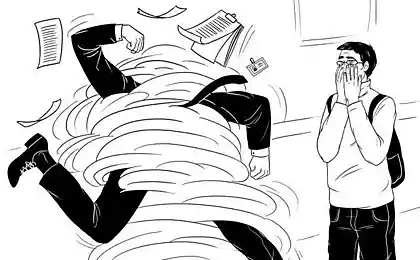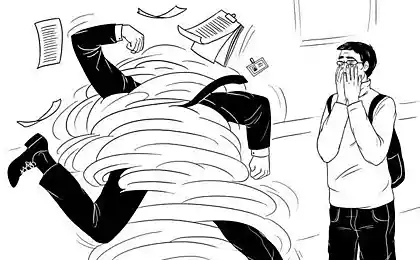434
The Case of the executioners on the payroll
$ 2, 3 million worth of American taxpayers every death sentence. Life imprisonment is much cheaper, but many supporters of the preservation of capital punishment is not confused. In the past, the same penalty is expensive, but there were people who knew how to make money on them. Chief Executive procedures executioner - the profession is now dying out as a chimney sweep or the driver. Nevertheless, while there are butchers, and some of them are still proud of their art.
Link

Acute justice
When the judge passes sentence, everyone understands that someone has to carry it out. If the sentence - prison or forced labor, someone should convict was transferred to the place of serving, and then watch him until the end of the period. If the sentence - is cutting off the hands of, say, or quartering, then someone will have to take up the ax. Therefore, if the country has the death penalty, then there are also the executioners. Most of them are real specialists providing services with professional calmness and efficiency. Yet a little different craft imprint on their character and fate.
Medieval torturers usually as a brawny thugs with a bag on his head. Indeed, these people needed a fair amount of physical strength, but to hide their faces there was no need. His executioners people knew by sight and by name, as in a small medieval town to remain incognito was impossible. In most European countries, the executioners were considered artisans like carpenters or saddlers, and their profession, they are usually proud and pass it by inheritance. In many countries, labor dynasties arose torturers, some of these dynasties have achieved wealth and even fame.
In medieval Germany butchers appreciated and generously rewarded for their work, as evidenced, in particular, the fate of Franz Schmidt, who served as the chief executioner of Nuremberg. Schmidt was born in 1555 in the family of the executioner of the city of Bamberg. In his youth he helped his father, gradually learning the intricacies of the craft, and in 1573 held its first independent penalty vzdernuv certain Leonard Russ, who was convicted for theft. Five years later, he got a job as an executioner in Nuremberg and married the daughter of the city's main executioner. After the death of his father-in-Schmidt he inherited position, and with it the considerable income. In Nuremberg, the chief executioner earned almost as a referee, which allowed him to lead the life of a very wealthy burgher. Incidentally, the "executioner" in German - Scharfrichter, that is, sounds like "a sharp judge».
Master Frantz, as it is now called, was careful and conscientious employee. He sought to bring flour condemned men to the minimum necessary and are often requested to replace the cruel punishment like broken on the wheel quick and easy Beheading. He also kept a diary in which quite dispassionately describes the case of the execution: "On 13 August 1594 the first summer. Weaver Christoph Maier and Hans Weber, fruiterer, both citizens of Nuremberg, what three years engaged in sodomy, were caught for their occupation journeyman ironmonger Goldsmiths ... Weaver was beheaded by the sword, and then his body was on fire with merchant fruit that He was burned alive. " Schmidt remained at peace with himself and with his conscience, because he believed that doing God's work, helping sinners atone for their sins. Master Franz remained in office 45 years, executing over the years 361 people, then retired and became a medical consultant, as understood in the anatomy better than many doctors. Schmidt died in 1634, surrounded by loving family and was awarded a magnificent state funeral. His tomb is surrounded by the graves of other prominent citizens of Nuremberg, in particular the great artist Albrecht Durer.
Source:
Link

Acute justice
When the judge passes sentence, everyone understands that someone has to carry it out. If the sentence - prison or forced labor, someone should convict was transferred to the place of serving, and then watch him until the end of the period. If the sentence - is cutting off the hands of, say, or quartering, then someone will have to take up the ax. Therefore, if the country has the death penalty, then there are also the executioners. Most of them are real specialists providing services with professional calmness and efficiency. Yet a little different craft imprint on their character and fate.
Medieval torturers usually as a brawny thugs with a bag on his head. Indeed, these people needed a fair amount of physical strength, but to hide their faces there was no need. His executioners people knew by sight and by name, as in a small medieval town to remain incognito was impossible. In most European countries, the executioners were considered artisans like carpenters or saddlers, and their profession, they are usually proud and pass it by inheritance. In many countries, labor dynasties arose torturers, some of these dynasties have achieved wealth and even fame.
In medieval Germany butchers appreciated and generously rewarded for their work, as evidenced, in particular, the fate of Franz Schmidt, who served as the chief executioner of Nuremberg. Schmidt was born in 1555 in the family of the executioner of the city of Bamberg. In his youth he helped his father, gradually learning the intricacies of the craft, and in 1573 held its first independent penalty vzdernuv certain Leonard Russ, who was convicted for theft. Five years later, he got a job as an executioner in Nuremberg and married the daughter of the city's main executioner. After the death of his father-in-Schmidt he inherited position, and with it the considerable income. In Nuremberg, the chief executioner earned almost as a referee, which allowed him to lead the life of a very wealthy burgher. Incidentally, the "executioner" in German - Scharfrichter, that is, sounds like "a sharp judge».
Master Frantz, as it is now called, was careful and conscientious employee. He sought to bring flour condemned men to the minimum necessary and are often requested to replace the cruel punishment like broken on the wheel quick and easy Beheading. He also kept a diary in which quite dispassionately describes the case of the execution: "On 13 August 1594 the first summer. Weaver Christoph Maier and Hans Weber, fruiterer, both citizens of Nuremberg, what three years engaged in sodomy, were caught for their occupation journeyman ironmonger Goldsmiths ... Weaver was beheaded by the sword, and then his body was on fire with merchant fruit that He was burned alive. " Schmidt remained at peace with himself and with his conscience, because he believed that doing God's work, helping sinners atone for their sins. Master Franz remained in office 45 years, executing over the years 361 people, then retired and became a medical consultant, as understood in the anatomy better than many doctors. Schmidt died in 1634, surrounded by loving family and was awarded a magnificent state funeral. His tomb is surrounded by the graves of other prominent citizens of Nuremberg, in particular the great artist Albrecht Durer.
Source:























